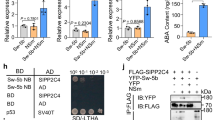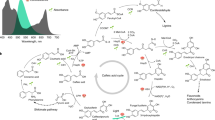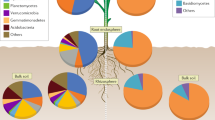Abstract
Venturia inaequalis (Cke.) Wint, is the fungus which causes “scab” disease of apple. Its perithecia develop in fallen apple leaves late in winter, and ascospores mature during spring. Various workers, for example, Hirst and Stedman1, have established that the ascospores are not released unless the leaves are wetted. I have found that greater numbers of ascospores are released when the wetted apple leaves are in the light than when they are in darkness2. Results reported here are from an investigation of release of ascospores by V. inaequalis in light of different spectral bands.
This is a preview of subscription content, access via your institution
Access options
Subscribe to this journal
Receive 51 print issues and online access
$199.00 per year
only $3.90 per issue
Buy this article
- Purchase on Springer Link
- Instant access to full article PDF
Prices may be subject to local taxes which are calculated during checkout
Similar content being viewed by others
References
Hirst, J. M., and Stedman, 0. J., Ann. Appl. Biol., 50, 525 (1962).
Brook, P. J., NZ J. Agric. Res., 12 (in the press).
Hillman, W. S., Ann. Rev. Plant Physiol., 18, 301 (1967).
Author information
Authors and Affiliations
Rights and permissions
About this article
Cite this article
BROOK, P. Stimulation of Ascospore Release in Venturia inaequalis by Far Red Light. Nature 222, 390–392 (1969). https://doi.org/10.1038/222390a0
Received:
Issue Date:
DOI: https://doi.org/10.1038/222390a0
This article is cited by
-
Comparison of wetness sensors and the development of a new sensor for apple scab prognosis
Journal of Plant Diseases and Protection (2019)
-
Inoculum dynamics and disease progress of circular leaf spot of persimmon caused by Mycosphaerella nawae in inland Korea
Journal of Plant Pathology (2018)
-
Understanding photoreception in fungi and its role in fungal development with focus on phytopathogenic fungi
Indian Phytopathology (2018)
-
Ascospores of the Japanese pear scab fungus (Venturia nashicola Tanaka & Yamamoto) are discharged during the day
Journal of General Plant Pathology (2008)
-
The Effect of UV and Visible Lightirradiation on the Development of Microsclerotium of the Fungus Macrophomina Phaseolina
Cereal Research Communications (2002)
Comments
By submitting a comment you agree to abide by our Terms and Community Guidelines. If you find something abusive or that does not comply with our terms or guidelines please flag it as inappropriate.



